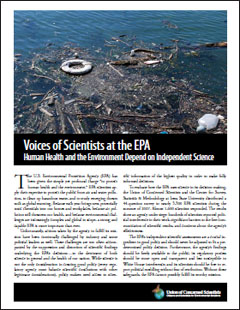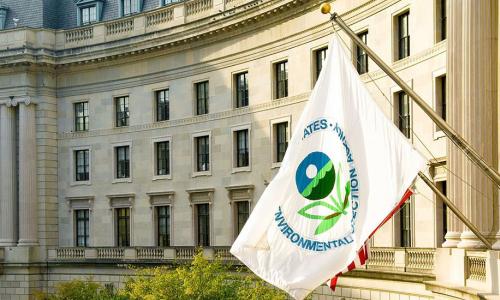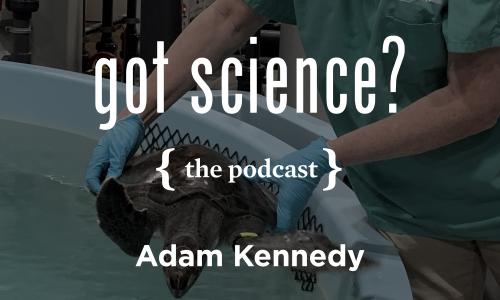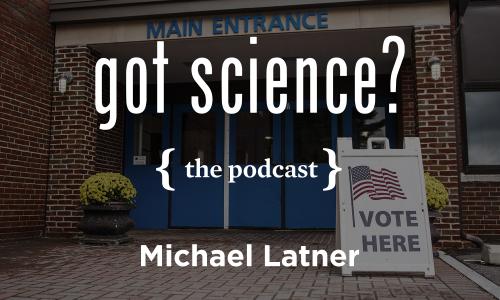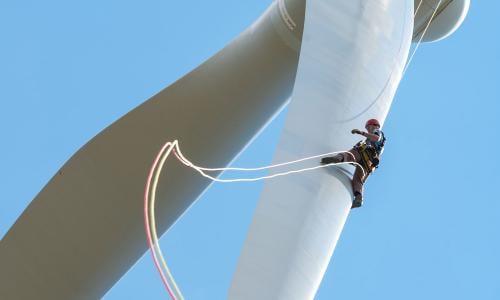The U.S. Environmental Protection Agency (EPA) has been given the simple yet profound charge "to protect human health and the environment."
To evaluate how the EPA uses science in its decision making, the Union of Concerned Scientists and the Center for Survey, Statistics & Methodology at Iowa State University distributed a 44-question survey to nearly 5,500 EPA scientists during the summer of 2007. Almost 1,600 scientists responded. The results show an agency under siege: hundreds of scientists reported political interference in their work, significant barriers to the free communication of scientific results, and concerns about the agency's effectiveness.
Jump to Survey Findings:
I. Findings Are Suppressed and Distorted
II. Scientists Are Pressured by Outside Interests
III. Communication Is Discouraged
IV. Science Goes Unheeded
V. Scientists Are Disheartened
Recommendations
I. Findings are suppressed and distorted
Large numbers of EPA scientists reported political interference with their scientific work:
- 889 scientists (60 percent of respondents*) personally experienced at least one type of political interference during the past five years.
- Among agency veterans (more than 10 years of experience at the EPA), 409 scientists (43 percent) said interference has occurred more often in the past five years than in the previous five-year period. Only 43 scientists (4 percent) said interference occurred less often.
- 94 scientists (7 percent) had frequently or occasionally been "directed to inappropriately exclude or alter technical information from an EPA scientific document."
- 191 scientists (16 percent) personally experienced frequent or occasional "situations in which scientists have actively objected to, resigned from or removed themselves from a project because of pressure to change scientific findings."
- 232 scientists (18 percent) personally experienced frequent or occasional "changes or edits during review that change the
meaning of scientific findings." - 285 scientists (22 percent) personally experienced frequent or occasional "selective or incomplete use of data to justify a specific regulatory outcome."
II. Scientists are pressured by outside interests
Political pressure on EPA scientists comes from the White House, EPA political appointees, and external commercial interests:
- 507 scientists (42 percent) knew of "many or some" cases in wich "commercial interests have inappropriately induced the
reversal or withdrawal of EPA scientific conclusions or decisions through political intervention." - 516 scientists (43 percent) knew of "many or some" cases in which EPA political appointees were inappropriately involved
in scientific decisions. - 560 scientists (49 percent) knew of "many or some" cases in which political appointees at other federal agencies were inappropriately involved in scientific decisions. Nearly 100 respondents identified the White House Office of Management and Budget (OMB) as the primary culprit.
III. Communication is discouraged
EPA scientists are not free to communicate their research findings to the media or public:
- 783 scientists (51 percent) disagreed or strongly disagreed that EPA policies allow scientists to "speak freely to the news media
about their findings," and another 556 had no opinion or were unsure (36 percent). Only 197 scientists (13 percent) agreed that the EPA had a policy of free communication with the media. - 291 scientists (24 percent) disagreed or strongly disagreed that they are "allowed to publish work in peer-reviewed scientific
journals regardless of whether it adheres to agency policies or positions." - Hundreds of scientists reported being unable to openly express concerns about the EPA's mission-driven work without fear of retaliation; 492 (31 percent) felt they could not speak candidly within the agency and 382 (24 percent) felt they could not do so outside the agency.
- 299 scientists (24 percent) personally experienced frequent or occasional "disappearance or unusual delay in the release of websites, press releases, reports or other science-based materials."
IV. Science goes unheeded
The EPA does not make consistent use of its staff and advisory committees' scientific expertise:
- 394 scientists (31 percent) personally experienced frequent or occasional "statements by EPA officials that misrepresent scientists'
findings." - 719 scientists (47 percent) felt that the agency's determinations occasionally, seldom, or never make use of its scientific staff’s best judgment.
- 565 scientists (37 percent) felt that EPA determinations and actions are occasionally, seldom, or never consistent with the scientific
findings contained in agency documents and reports. - 553 scientists (36 percent) felt that expert advice from independent scientific advisory committees is occasionally, seldom, or never heeded and incorporated into regulatory decisions.
V. Scientists are disheartened
EPA scientists reported decreased job satisfaction and concerns about agency effectiveness:
- Twice as many respondents reported a decrease in job satisfaction (670 scientists or 43 percent) over the past five years as those who reported an increase (328 scientists or 21 percent).
- 951 scientists (62 percent) said morale within their divisions was fair, poor, or extremely poor; 570 (36 percent) said morale was good or excellent.
- 696 scientists (45 percent) reported that the effectiveness of their divisions or offices has decreased over the past five years. Only 321 scientists (21 percent) said effectiveness has increased.
- Respondents are evenly split on whether the EPA is moving in the right direction (624 scientists or 40 percent) or the wrong
direction (685 scientists or 44 percent). - 969 scientists (63 percent) disagreed or strongly disagreed that their divisions have sufficient resources to adequately fulfill the agency’s mission.
- 555 scientists (36 percent) agreed or strongly agreed that the "recent changes and closures in the EPA library system have impaired my ability to do my job." Nearly half of the respondents (48 percent) from Regions 5, 6, and 7—where libraries were closed—agreed or strongly agreed.
Recommendations
The EPA's independent scientific assessments are a crucial ingredient in good policy and should never be adjusted to fit a predetermined policy decision. Furthermore, the agency's findings should be freely available to the public; its regulatory process should be more open and ransparentand less susceptible to White House interference; and its scientists should be free to report political meddling without fear of retribution.Without these safeguards, the EPA cannot possibly fulfill its worthy mission.
*Unless otherwise stated, percentages reflect the share of respondents who answered a specific question.
